Homemade vs. Store Bought: Which Version Will Save You Money on Groceries?
As we lead busy lives in a fast paced city, we tend to take the easy way out when it comes to preparing our meals. Some of us opt for time-smart recipes that can be rustled up in under 30 minutes, and that often involves using store bought items, canned food and ready made condiments. However, while buying ready-made dinners seems more convenient, there is a case to making common ingredients at home. In fact, some food products can be homemade in minutes, could be more cost efficient and are healthier than ready made items from the supermarket. In this article, we compare the costs of homemade and store bought food products to find out which option saves you more money.
1. Dairy
Dairy products are notoriously expensive in Singapore as most of the cheese, cream, and butter in stores are imported. Butter is surprisingly easy to make at home simply by whipping heavy cream in a food processor or using an electric hand mixer for 10 minutes until the solids separate from the liquid. After straining and squeezing out the liquid, the solids that remain are now butter and the liquid is buttermilk that can be drank for breakfast or used to marinate meat. While making butter does require some time investment, it is quite cheaper than store-bought butter. 240ml to 300ml of heavy cream that costs S$4.15 yields 200g to 250g of butter, making it 26% cheaper compared to butter sold in stores.
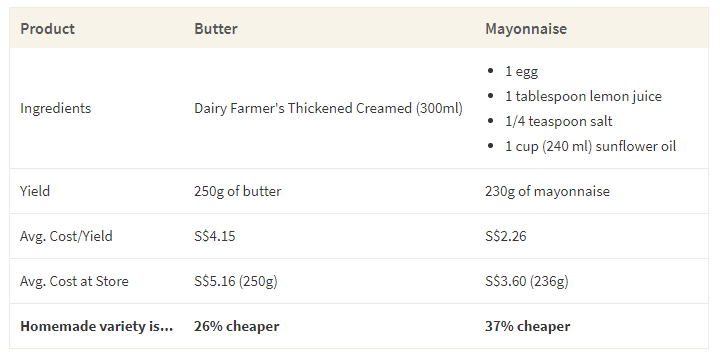
Another dairy product you can make at home is mayonnaise. Store bought mayonnaise often contains preservatives and additives that give it flavour and a longer shelf life. On the other hand, homemade mayonnaise is healthier as it contains zero additives. In under 10 minutes, you can have about 266 ml of mayonnaise by emulsifying (the combination of 2 of more ingredients that normally don’t mix easily, i.e. oil and water-based liquid) an egg, some mustard seeds, lemon juice, oil and salt in a food processor or using an electric hand mixer. The ingredients are all pantry staples and while they cost more to buy initially, the actual cost for making 230 grams of mayonnaise is 37% less than the store-bought variant.
2. Condiments
A classic breakfast condiment, peanut butter can be made in 5 minutes by blending roasted peanuts until it reaches a smooth chunky or creamy consistency. Unlike store bought peanut butter, you have control over what you want to add to your homemade peanut butter. For instance, you can add honey or cinnamon instead of sugar for a hint of sweetness, or a tiny bit of oil for extra creaminess. Just 600g of peanuts yields about 568g of peanut butter, costing you about S$5.40, while 454g-510g of store bought peanut butter costs between S$5.20 to S$8.25. To accompany peanut butter, fruit jams can also be made by cooking fresh or frozen berries with sugar and lemon juice until the fruits soften, release liquid and the mixture reaches a jam-like consistency. However, as strawberries in Singapore are imported, 450g of fresh strawberries would cost you about S$19, and yields about 487g of strawberry jam, so you’re better off buying a jar from the supermarket for S$4.95.
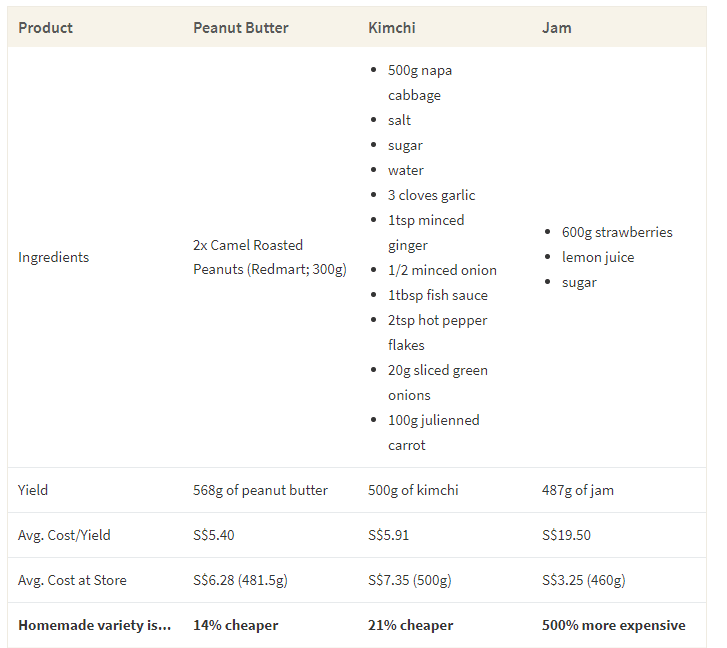
Kimchi is another popular condiment you can make at home for just about S$6, while store bought kimchi costs above S$7. This Korean staple is made by fermenting Napa cabbage or Wong Bok with a spicy paste made of chilli flakes, chilli powder, garlic, scallion and shredded carrot. The whole process takes less than 20 minutes if you don’t include the 2-hour salting and fermentation time of 2 weeks. Unlike imported and pricey store bought varieties, homemade kimchi doesn’t include flavour enhancers and additives. Since these recipes require a large number of ingredients, we also recommend using a credit card that provides rewards and cashback on groceries. Some cards can provide grocery rebates as high as 8%.
3. Soups/Stock/Broth
Store bought soups, stock and broth are convenient ways to whip up a quick meal, but they contain more salt and flavour enhancers than we need. You can easily make your own chicken soup, bone broth or vegetable stock by boiling chicken carcass for 6 hours, pork bones for 12 hours or vegetable scraps for 2 hours. Save the chicken carcass from a whole chicken that you’re eating or put unusable veggie scraps like carrot top, bell pepper top, carrot peel and other vegetable parts you’d usually throw away into a ziplock bag until you have a full bag to make a stock with. Making broth at home, while time consuming, would cost you just S$2 to S$4, compared to the store bought broths which cost almost twice that. However, due to the time it takes to make and the initial cost of the ingredients, it may be more convenient to make broth as a way to reuse leftovers, rather than purchasing the ingredients just to make the stock.
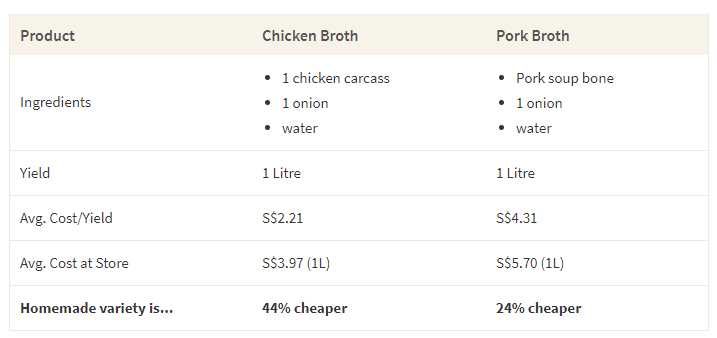
4. Confections
For most people, baking is intimidating as it requires precision. Many opt for convenient boxed brownie, cookie and cake mixes if they feel like having a sweet treat fresh from the oven. However, these boxed mixes come with artificial flavoring and substances. Besides that, baked-to-order desserts from cafes and bakeries are sold at a significant markup due to the effort it takes to create these confections, ranging from S$6 for a box of 4 - S$15 for a box of 9.
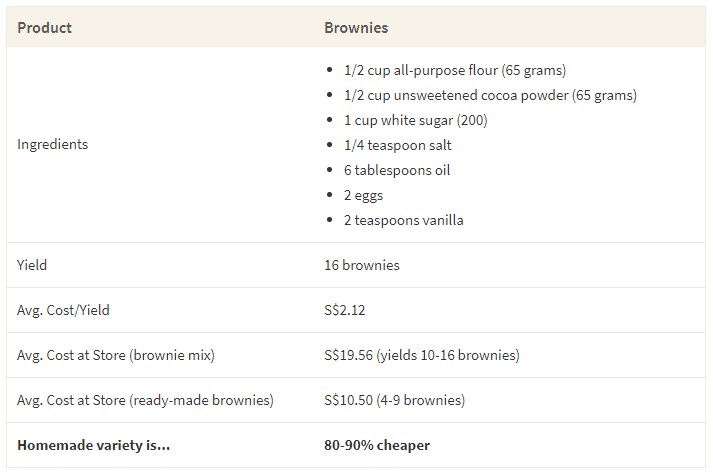
However, most baked goods can be made at home for that comforting from-scratch taste. For instance, you can make 16 brownies in just under 30 minutes with basic ingredients. You'll need baking ingredients like all-purpose flour, eggs, baking powder, baking soda, vanilla extract and cocoa powder, and pantry staples like oil and salt, all whisked in a big bowl. Your brownie ingredients will cost you about S$2.13 per batch, or 80-90% less than what you would pay at the store per brownie.
5. Dairy Alternatives
Dairy-free milk is the only choice for those who are lactose intolerant or vegan, but it has also been marketed as a more sustainable choice as more people question the ethics of the farming industry. According to a 2019 Grand View Research report, returns on soy, rice, and almond milk were approximately 6% higher than those on conventional milk and milk products in between 2014 and 2015. In Singapore, plant and nut milk costs between S$4 to S$7 which is just as much, if not more than conventional milk. However, these plant-based and nut milk products can be made at home in 5 minutes for S$0.20 to S$0.60 by blending rolled oats, uncooked rice or raw nuts of choice with a pinch of salt, optional pitted dates for sweetness, hot water and straining through a fine sieve. However, you’re better off buying almond milk as raw almonds are expensive in Singapore, and you’d have to shell out at least S$7 to make a liter of almond milk at home.
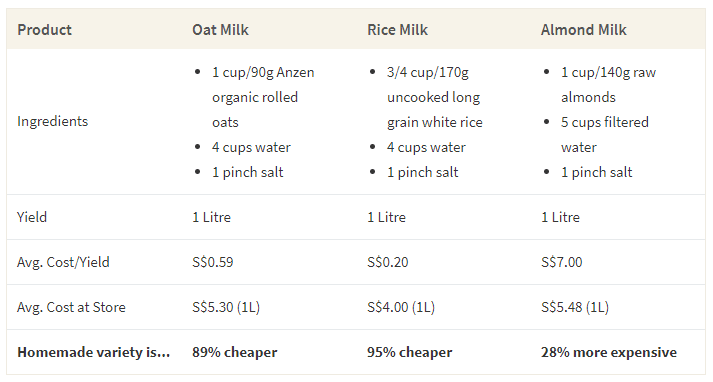
What's Worth the Investment of Time and Money?
With the exception of almond milk and strawberry jam, most homemade food items cost between 14% to 90% less than their store bought/ready made versions. Most of these store bought items can be made with multi-purpose kitchen equipment such as a food processor, blender or hand mixer. These are worthwhile investments if they allow you to make different types of food items that are not only cheaper, but also healthier than store bought ones. However, as the saying goes: Time is money. What’s worthwhile depends on what your priorities are. If your health is your number one priority, perhaps spending some time on a weekend to make your own food products without additives will be worth the time you spend cooking. On the other hand, if the time spent on homemade food products can be spent on making more money than you’d potentially save, perhaps the savings are insignificant and your time could be put to better use elsewhere.
